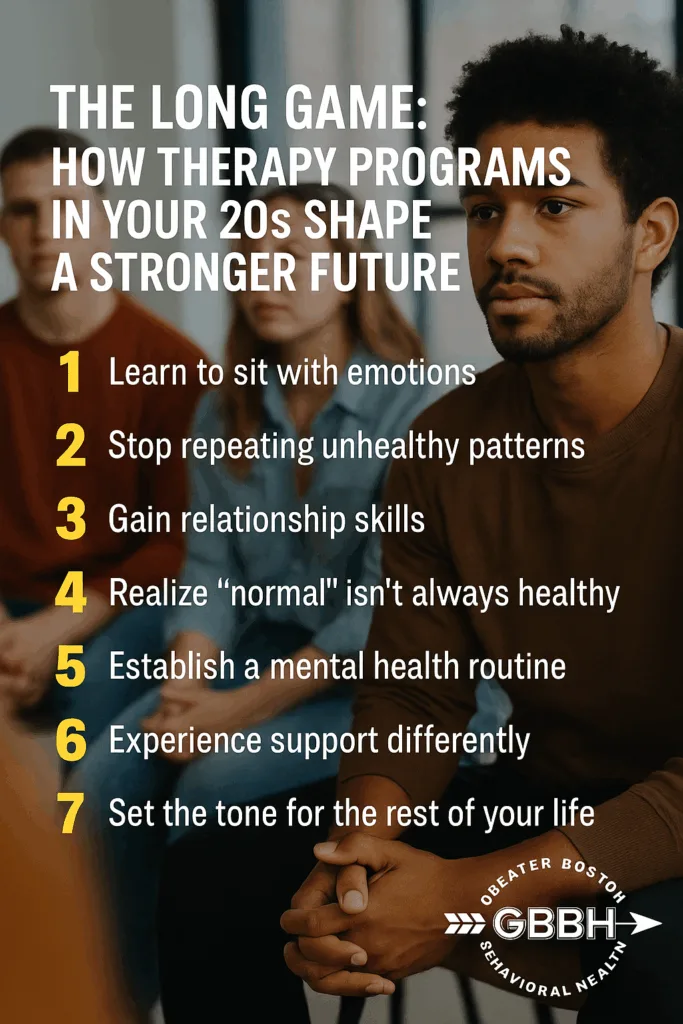Even if you’re proud of being sober, it can still feel like you’re the only one.
Parties, group chats, awkward dates—so much of your twenties seems to revolve around drinking, using, or shrugging off what you’re really feeling. So when you’re the one showing up to a therapy session while your friends head to a bar, it’s easy to wonder: is this actually helping?
Here’s the truth: if you’re investing in therapy during your twenties, you’re not behind—you’re early. You’re not weird—you’re wise. You’re playing the long game.
Therapy programs give you the tools and space to build the kind of life that doesn’t burn you out by 30. At Greater Boston Behavioral Health, we work with young adults all the time who feel like the “odd one out” because they’re doing the inner work. But time and again, those same clients come back and say: “I’m so glad I started this when I did.”
1. You Learn to Sit With Emotions—Instead of Stuffing Them
Let’s be honest: most people aren’t taught how to feel. We’re taught how to cope—fast, loud, messy, or numbed out.
In therapy, that changes. You learn how to recognize your emotional patterns, name what’s going on underneath, and make space for it without shutting down or blowing up. It’s one of the most foundational skills therapy teaches—and it ripples out everywhere.
“I used to think I was just ‘too sensitive.’ But therapy helped me understand that I was overwhelmed, not broken,” said one 25-year-old client.
Once you learn to handle emotions without fear, you’re not just surviving. You’re steering your own life again.
2. You Stop Repeating Patterns That Don’t Serve You
Maybe it’s always dating people who don’t treat you well. Maybe it’s ghosting when things get real. Maybe it’s saying yes when your body screams no. These patterns don’t come from nowhere—and therapy helps you trace the line back to the root.
You start to notice the “why” behind your choices. You gain awareness. And with time, you gain options.
This isn’t about becoming perfect. It’s about becoming free. Free to choose differently—even if it’s messy at first.
3. You Get Relationship Skills Nobody Else Is Learning
When you’re sober in your 20s, friendships can feel tricky. You might feel like you’re constantly explaining yourself—or like you just don’t click with the people you used to. That’s where therapy makes a huge difference.
It helps you navigate:
- Setting boundaries without feeling like a jerk
- Being honest without oversharing
- Listening without losing yourself
- Choosing relationships that feel mutual, not performative
And those aren’t just sobriety skills. They’re life skills. Whether you’re looking for therapy programs in Dedham, MA or staying local in Boston, you’ll carry these tools into every relationship you build.
4. You Learn That “Normal” Isn’t Always Healthy
A lot of what passes as normal in your twenties is actually pretty harmful. Overwork, hookup culture, ghosting, and constant comparison don’t create joy—they create burnout.
Therapy helps you step back and ask: “Is this working for me?”
You stop measuring your worth by what everyone else is doing. You stop needing validation from people who don’t even know you. And you start building a version of adulthood that’s not just bearable—but meaningful.
5. You Create a Mental Health Routine That’s Yours
Sustainability matters. And if therapy becomes part of your weekly rhythm now, you’ll have something sturdy to lean on when life gets unpredictable—which it will.
Your therapist isn’t just someone you vent to. They’re someone who knows you well enough to notice when you’re drifting—and help you come back to yourself.
Whether you stay in therapy long-term or just for a season, the routine builds resilience. And the skills stick.
6. You Redefine Support—And Realize You Deserve It
If you’ve ever been the one people “vent to,” it can be hard to realize that you’re allowed to receive support too. Therapy flips that script.
You experience what it’s like to be heard fully, without interruption. You learn that your pain doesn’t have to be dramatic to be valid. And you slowly stop apologizing for needing care.
“I didn’t realize how much I was carrying until I started talking,” one client told us. “Therapy gave me somewhere to put it down.”
7. You Set the Tone for the Rest of Your Life
This is what the long game looks like:
- You build self-respect early, so you don’t settle later.
- You learn to regulate your nervous system, so you don’t implode during change.
- You get honest with yourself, so you can be honest with others.
Therapy isn’t a quick fix—it’s an investment. One that keeps paying off in clearer boundaries, better choices, and deeper peace.
If you’re looking for therapy programs in Newton, MA, or just trying to figure out your next step, don’t wait until crisis hits. You don’t need to earn help by breaking down first.
FAQ: Therapy in Your 20s
Is therapy really necessary if I’m not in a crisis?
Yes. Therapy isn’t just for crisis—it’s for clarity, growth, and self-awareness. Starting when you’re stable can actually help you stay grounded when life gets harder.
How do I know what kind of therapy program I need?
A good provider will help you figure that out during your intake. At Greater Boston Behavioral Health, we offer both individual therapy and structured programs like intensive outpatient therapy—depending on your goals, time, and needs.
Will therapy make me feel more different from my friends?
Sometimes, yes—but in a good way. You may notice things more deeply or make different choices. That discomfort can be a sign of growth. And over time, you’ll attract connections that actually align with your values.
How long does therapy take to work?
That depends on your goals. Some people notice changes after a few weeks; others stay in therapy for years. What matters is that you feel safe, heard, and challenged in a way that helps you grow.
What if I’m nervous to start?
Totally normal. You don’t have to be “ready” to start—you just have to be willing. A good therapist will meet you where you are and help you move at a pace that feels okay.
Ready to Talk?
Therapy in your 20s might feel lonely at first. But it’s also one of the bravest, most future-forward things you can do.
Call (888) 450-3097 or visit to learn more about our Therapy Programs services in Boston, Massachusetts.


